THE OPPOSITION'S ATTACK
BY the time these words are read the two-day censure debate in the House of Commons will have run its course and ended in a division which will mean precisely nothing. A Government with a majority of approximately two hundred has little to fear in the division lobby, where the decision of none but a possible handful of independents is determined by the arguments advanced in debate. The wisdom of the Opposition in putting down a vote of censure at this juncture is questionable. If Ministers had been given a little more rope (it might well be argued) they could have been counted on with confidence to employ it in the usual manner ; if they are as incompetent as the Opposition suggest a much heavier indictment might be drawn against them a little later. That, how- ever, is a matter of Parliamentary tactics. It does not touch the essence of the question, which is how far, if at all, the Government has in its four months or so of office forfeited the confidence which the country so decisively reposed in it in July. That is a question every elector is capable of answering broadly for himself, without the valuable assistance of the Opposition. But the more anxious he is to give a genuinely fair answer the more convinced he is likely to become that to press for an answer at this early stage is premature. There are, no doubt, to the Government's credit acts of omission or of commission on which judgements may be based, but it is no use blaming it for what it has not yet had time to do, and while there may be every ground for believing that Mr. Aneurin Bevan will fail to produce the necessary houses, Mr. Shinwell the necessary coal, Sir Stafford Cripps the necessary export trade, each of the Ministers in question can contend with some reason that (to borrow a metaphor from Mr. Bevan's sphere) he is still only laying foundations and that to ask for the sight of a finished structure is unreasonable. That kind of protestation will not hold water long, bin at this stage some justification can still be claimed for it.
It follows that debate on the Government's defaults at this stage is a little unreal, as the opening interchanges on Wednes- day showed clearly enough. An indictment can undoubtedly be drawn against the Government. It can be charged with what Mr. Oliver Lyttelton called a palsied demobilisation policy ; it is true incontestably that thousands of men are doing nothing but waste time in the Army while industry at home is clamouring for them, and they ask nothing better than to get back to produc- tive work. But the dilemma remains, and it would face any Government—are men at home, who can perfectly well be spared from the Army, to be released while others of a higher group are still on service abroad? Such a step would be of obvious economic value, but the injustice between man and man would be such that it can plainly not be contemplated. On that the Government must take its stand ; the Bevin scheme holds the field and no serious m41ification of it is possible, though it is arguable that it can and should be speeded up considerably ; the disparity between America's rate of discharge and our own is marked. On controls it is equally difficult to reach any finality. Conservatives can point to the frustration and hindrance caused by those still in force, Government speakers can enumerate those that have been abrogated, and point to the steady removal of shackles in this quarter and that. On the whole it does no harm for the Opposition to keep pressing for a return of liberty, but the dispute is really only over marginal cases. Over a wide field, particularly in regard to such matters as rationing of food and clothing, the necessity for the continuance of controls is common ground.
Nationalisation is a far more contentious question, though so far as Wednesday's debate was concerned the edge of the Opposi- tion's attack was a little blunted by the publication that very morning—singularly opportunely for the Government—of the committee set up by the Coalition Government to consider the future of the gas industry. The decision in favour of something that is not, it is true, nationalisation, but like enough to it to be mistaken for its twin, was taken not by a Socialist Minister but by a far from Socialist committee presided over by the head of one of the greatest capitalist concerns in the country. That Sir Stafford Cripps should make considerable play with that was inevitable, and it does in fact go some way to support his claim that nationalisation is not an end in itself, but simply a means of achieving co-ordination for the sake of efficiency. That, of course, is no more than a claim. The test is whether efficiency is in the end achieved or not, and the probabilities in regard to that are as strong one way as the other. There is, in particular, full justifi- cation for the doubts Mr. Lyttelton expressed as to the capacity of a hopelessly overdriven Civil Service to cope with a vastly increased centralisation of administration in Whitehall ; when all sources have been scoured the shortage of men (and women) of first-rate ability is likely to be acute. Coal seems likely to provide the first test, and there is nothing there to encourage any present optimism. If nationalisation is to prove the stimulus to increased production which Socialists have always declared it would be, it is clear that the mere promise of nationalisation yields no such result. Output is still dropping, and already the prospect of the realisation of Mr. Shinwell's target figure of 8,000,000 tons extra this winter is receding fast. The best that can be said of national- isation of the coal industry is that no better means of revivifying the industry has been suggested. But it is still far from clear that this is in fact a sound means, or that it will prove effective.
The censure debate, as has been said, could produce no results of value. Yet results, in the form of some dissipation of the existing atmosphere of uncertainty, are needed urgently. In such an atmosphere no business can prosper. That is the essen- tial vice of the nationalisation campaign. Sir Stafford Cripps may be right in saying that the Government does not want national- isation for its own sake, but it is plain that a great many of the Government's supporters do, and there is no way of telling today how far the tide will flow. It may be that the Government, striking against practical difficulties which in the early stage of mere platform speeches troubled it little, will, as in the case of road transport, tend to modify its original intentions. It may be, on the other hand, that, impelled by the demands of its back- benchers, it will go further and faster than its more prudent and experienced members at all desire. In either case pernicious uncertainty remains, and business today is almost equally frustrated by such uncertainty and by departmental hindrances and delays. It is no use arguing about the latter in the House of Commons ; every business man has bitter experience of them every day. To a large extent they may be necessary, but it would be more reassuring to see Ministers fighting the evil than defending it. With the political situation what it is, that industrial and com- mercial development should be hanging fire is inevitable. No prudent man would plan large extensions of his business—and large business extensions are badly needed—till he knows how far nationalisation is coming in his direction, and to what extent he is to be subject to a mass of crippling rules and regulations framed by Ministers and Civil Servants with, except in rare cases,. no shred of personal experience of the practical problems that form his daily concern. So-called co-operation between Govern- ment and industry can assume a stimulating or a sterilising form, with some odds in favour of the latter. Therein lies the justification for constant and constructive criticism by a Parliamentary Opposition. Mr. Harold Macmillan claimed on Wednesday that it was that contribution which this Opposition aspired to make. If that can be established well and good. The economic crisis is grave enough to make all-party Collaboration very nearly indis- pensable. Unfortunately the fundamental and perfectly genuine differences of opinion as to the wisdom of nationalisation, except in a restricted area of common ground, make that hard to realise. It would make greatly for confidence and stability if the Govern- ment would lay down plainly the limits beyond which in the present Parliament it would not go. What degree of freedom can private enterprise—the backbone of the country, though for Sir Stafford Cripps business men are comprehensively "profiteers "- count on retaining? If this week's debate elicited a clear state- ment on that it would be well worth while.































 Previous page
Previous page